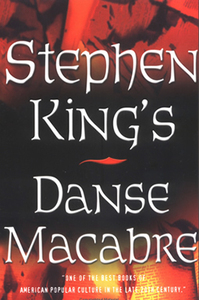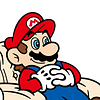Take a photo of a barcode or cover
Quite an interesting view on a specific period of the horror genre in various mediums. Only the stars, because it's quite US focused, and sometimes the facts about a particular period or work are pushed aside by King giving his opinion, but it does cover a lot of ground, and there is bound to be some work mentioned that you've not heard of before.
Ick I hated to hear this guys voice for one of my fav SK books! Bob the Builder's voice and style of speaking doesn't match to the author's writing or speaking style whatsoever!
This was kind of tough to get through, especially the films section... Re-reading over 20 years after I first read it, now I've read most of the books he covers! Still not read any Straub apart from the collabs.
You don’t have to always follow your heroes through the gates of Hell. If Indiana Jones asks you to step into the Temple of Doom with him, you say “no thank you, Mister Jones. Call me when you’re looking for the cup of a carpenter, I want something a bit less imperialist.” This is a laboured metaphor already, but it turns out that Danse Macabre, Stephen King’s first non-fiction effort,is full of them. And “heh heh” asides. And blatant errors — Peter Pan and the “Wild Boys”, “Anarchy for the U.K.” — that have not been corrected in thirty years of reprints.
It’s not a case of don’t meet your heroes, but rather a case of “the past is a different country, you weren’t born yet, and nothing in this book means anything to you”. Danse Macabre does not hold up to a modern reader, dealing as it does with works that have largely been obscured by time, none of which have endured like the output of its author. Scrappy, and written with a giant chip on its shoulder, Danse Macabre is a curio.
In Danse Macabre, Stephen King set out to write a book that would mean he would never have to tell people what horror meant to him again. King walks the reader through the horror books, movies, and television programs of 1950 to 1980, with a primer on the works that he considers the parents of the genre: Frankenstein, Dr. Jekyll and Mr. Hyde, and Dracula.
The book’s title, intro and outro are all linked by the concept that King is waltzing the reader through the history of horror. A ballroom metaphor gets introduced, but Lloyd is not on hand to make us our martians — and King forgets about his linking device and moves across to the concept of a Tarot deck instead, to produce monsters from. It works for classification purposes — and King is a remarkable stickler for genre delineation — but it means that you will almost certainly have forgotten the framing device by the end, deadening its effectiveness (although King does that himself by blaming television for all of societies ills).
Frequently throughout the book, King asserts that critical analysis is the death of entertainment, art or otherwise. What is Danse Macabre, then? Much of the time King will bring up a title and deep dive into it, telling us exactly what happens — often in minute detail — and frequently what it means. Much of the diving is based around assumed knowledge, and a reader can drown for lack of context. King decries the snobbery of others in a work that is entirely informed by his own personal tastes and the disdain that he feels towards certain titles. It makes you wonder precisely what Danse Macabre is, and what purpose it serves. It’s not comprehensive, and outside of the Tarot card section, it’s not overly informative.
Admittedly, much has changed in the cultural landscape since Danse Macabre, near forty years ago. There are people now who have devoted their lives to the study of horror, with more laser-focused tomes to their names. King, by his own admission, was working blind, rewatching work himself, and relying on magazines with episode guides for TV shows. When King is vague — and he is vague quite often — it is because he’s apparently relying on shadowy memories. Why he even included television is a mystery: he hates the format, doesn’t think practically anything it has ever shown is any good, and has a reactionary leaning to it being a malign influence demoralising society and causing mass delinquency. It’s not a good look on the man, but it’s safe to say that King’s impression of the medium has been revised upwards in the intervening years.
It is difficult to say if Danse Macabre was ever good; in the apparently barren wasteland that was 1981, it may have been refreshing. Between the fan communities, magazines, and conventions of the day, there was no shortage of material enthusing about the genre, but academia was thin. One could argue that Danse Macabre is not an academic piece — realistically, it’s just the opinions of one man — but it still filled a gap that is by 2019 well served indeed. The 2010 edition comes with a new introduction that is better written and more informative than anything included between the pages of the original publication.
It’s difficult not to consider two King biographical details in the reading of Danse Macabre: he was writing Pet Sematary at the time, working through Owen’s brush with death and feeling generally nihilistic; and it was born of a heavy drinking session with a friend, in what we will come to understand was a decade of consistent heavy drinking and other consumption besides. It’s a rare instance of King referring to alcoholism in a lighthearted manner, especially given that The Shining was about a writer who drank to excess to the detriment of his family. Danse Macabre isn’t a particularly enthusiastic book, and King’s personal asides tend more towards the cynical than loving. It doesn’t read as a call for help, but it does indicate at least a slightly troubled man, possibly one dealing with an alternate universe dead son.
Danse Macabre is the work of a man who had already met with success but still felt he had to prove himself. Reading it from the vantage point of knowing that King has published 59 books, received multiple awards, and had adaptations beyond count, it’s clear that he has his place in history. Danse Macabre is a blip in his career, and not a particularly useful one for Constant Readers or horror fans alike.
It’s not a case of don’t meet your heroes, but rather a case of “the past is a different country, you weren’t born yet, and nothing in this book means anything to you”. Danse Macabre does not hold up to a modern reader, dealing as it does with works that have largely been obscured by time, none of which have endured like the output of its author. Scrappy, and written with a giant chip on its shoulder, Danse Macabre is a curio.
In Danse Macabre, Stephen King set out to write a book that would mean he would never have to tell people what horror meant to him again. King walks the reader through the horror books, movies, and television programs of 1950 to 1980, with a primer on the works that he considers the parents of the genre: Frankenstein, Dr. Jekyll and Mr. Hyde, and Dracula.
The book’s title, intro and outro are all linked by the concept that King is waltzing the reader through the history of horror. A ballroom metaphor gets introduced, but Lloyd is not on hand to make us our martians — and King forgets about his linking device and moves across to the concept of a Tarot deck instead, to produce monsters from. It works for classification purposes — and King is a remarkable stickler for genre delineation — but it means that you will almost certainly have forgotten the framing device by the end, deadening its effectiveness (although King does that himself by blaming television for all of societies ills).
Frequently throughout the book, King asserts that critical analysis is the death of entertainment, art or otherwise. What is Danse Macabre, then? Much of the time King will bring up a title and deep dive into it, telling us exactly what happens — often in minute detail — and frequently what it means. Much of the diving is based around assumed knowledge, and a reader can drown for lack of context. King decries the snobbery of others in a work that is entirely informed by his own personal tastes and the disdain that he feels towards certain titles. It makes you wonder precisely what Danse Macabre is, and what purpose it serves. It’s not comprehensive, and outside of the Tarot card section, it’s not overly informative.
Admittedly, much has changed in the cultural landscape since Danse Macabre, near forty years ago. There are people now who have devoted their lives to the study of horror, with more laser-focused tomes to their names. King, by his own admission, was working blind, rewatching work himself, and relying on magazines with episode guides for TV shows. When King is vague — and he is vague quite often — it is because he’s apparently relying on shadowy memories. Why he even included television is a mystery: he hates the format, doesn’t think practically anything it has ever shown is any good, and has a reactionary leaning to it being a malign influence demoralising society and causing mass delinquency. It’s not a good look on the man, but it’s safe to say that King’s impression of the medium has been revised upwards in the intervening years.
It is difficult to say if Danse Macabre was ever good; in the apparently barren wasteland that was 1981, it may have been refreshing. Between the fan communities, magazines, and conventions of the day, there was no shortage of material enthusing about the genre, but academia was thin. One could argue that Danse Macabre is not an academic piece — realistically, it’s just the opinions of one man — but it still filled a gap that is by 2019 well served indeed. The 2010 edition comes with a new introduction that is better written and more informative than anything included between the pages of the original publication.
It’s difficult not to consider two King biographical details in the reading of Danse Macabre: he was writing Pet Sematary at the time, working through Owen’s brush with death and feeling generally nihilistic; and it was born of a heavy drinking session with a friend, in what we will come to understand was a decade of consistent heavy drinking and other consumption besides. It’s a rare instance of King referring to alcoholism in a lighthearted manner, especially given that The Shining was about a writer who drank to excess to the detriment of his family. Danse Macabre isn’t a particularly enthusiastic book, and King’s personal asides tend more towards the cynical than loving. It doesn’t read as a call for help, but it does indicate at least a slightly troubled man, possibly one dealing with an alternate universe dead son.
Danse Macabre is the work of a man who had already met with success but still felt he had to prove himself. Reading it from the vantage point of knowing that King has published 59 books, received multiple awards, and had adaptations beyond count, it’s clear that he has his place in history. Danse Macabre is a blip in his career, and not a particularly useful one for Constant Readers or horror fans alike.
This is a mostly interesting, largely stream of consciousness effort by King to explain what horror is and how it developed as a genre. It's impressive, though not surprising, how much he had consumed. He says that autobiography is boring, but I found it the most interesting part of the whole deal. So you hear how he came up with The Stand, he mentions how he has a forthcoming book on a father who tries to bring his son back from the dead, and you get descriptions of his formative years.
It struck me how often he referred to drinking heavily. At one point, he talks about a book launch party where he says he took it easy, but then ended up drinking at least 14 beers.
Kingisms:
(19) He mentions the "he thrusts his fists against the posts" line that later he uses in IT.
Multiple mentions of JFK assassination
It struck me how often he referred to drinking heavily. At one point, he talks about a book launch party where he says he took it easy, but then ended up drinking at least 14 beers.
Kingisms:
(19) He mentions the "he thrusts his fists against the posts" line that later he uses in IT.
Multiple mentions of JFK assassination
informative
reflective
slow-paced
It was interesting in places but some of the points were described in a convoluted manner. Also there was a hint of snobbery about certain horror stories that I found a bit hypocritical.
Not a bad book. I just didn't care about the topics he was writing on.
The book begins with this story: on October 4, 1957, Stephen King was 10 years old, watching a Saturday matinee of Earth vs. the Flying Saucers. Just as the saucers were mounting their attack on "Our Nation's Capital," the movie was suddenly turned off. The manager of the theater walked out onto the stage and announced, "The Russians have put a space satellite into orbit around the earth. They call it ... Spootnik."
And thus began Mr. King's journey into science fiction and horror. This is a great book that was originally a college course he taught at the University of Maine. It feels like the author is right there in the room just talking to you; a conversational style that is really neat. I love this book!
And thus began Mr. King's journey into science fiction and horror. This is a great book that was originally a college course he taught at the University of Maine. It feels like the author is right there in the room just talking to you; a conversational style that is really neat. I love this book!
As much as I love Stephen King's fiction novels, I do also enjoy his non-fiction efforts. Especially as Danse Macabre can perhaps be summed up thusly: The King of Horror takes an analytical look at all things horror.
Shortly summarized, he takes a close look at what makes horror work, why it's scary, and even why it might be necessary for the human psyche. And he reveals an encyclopedic knowledge of the genre and its history in the process. He also points out how horror and science fiction from one period to the next naturally mirror what's going on both in general society as well as the current political climate. I liked the way he divided different stories into specific archetypes such as The Vampire, The Werewolf, and The Thing With No Name (with the stories not always literally being about vampires or werewolves).
But what I loved most of all, is how this book feels like an extended version of some of the interviews I've seen of him, where he's just chatting away about topics he is passionate about. In the book, he invites you to dance with him, as a metaphor for traveling through the entire horror universe and exploring it. And it truly does feel like a dance - a verbal one, mind you - where he naturally takes the lead, and you just follow along and enjoy the ride.
I've read some other non-fiction books on horror before, and while some of them have also been interesting to read, they've usually stayed on topic, and as such, can come off as a bit dry. King's approach in this book feels as casual and natural as his fiction. He'll digress, reminisce, go on tangents, serve up the occasional smartass rebuttal aimed at critics either of his own work or of horror as a whole, and it feels less like an academic lecture and more like that guy who'll always grab the attention of people around him at a bar, telling tall tales and being both entertaining and charismatic.
Some things are of course a bit outdated by now, as this was originally published in 1980, but I'd still say that there are plenty of core elements in his analysis of the genre which still ring true to this day.
Thanks for the dance, King!
Shortly summarized, he takes a close look at what makes horror work, why it's scary, and even why it might be necessary for the human psyche. And he reveals an encyclopedic knowledge of the genre and its history in the process. He also points out how horror and science fiction from one period to the next naturally mirror what's going on both in general society as well as the current political climate. I liked the way he divided different stories into specific archetypes such as The Vampire, The Werewolf, and The Thing With No Name (with the stories not always literally being about vampires or werewolves).
But what I loved most of all, is how this book feels like an extended version of some of the interviews I've seen of him, where he's just chatting away about topics he is passionate about. In the book, he invites you to dance with him, as a metaphor for traveling through the entire horror universe and exploring it. And it truly does feel like a dance - a verbal one, mind you - where he naturally takes the lead, and you just follow along and enjoy the ride.
I've read some other non-fiction books on horror before, and while some of them have also been interesting to read, they've usually stayed on topic, and as such, can come off as a bit dry. King's approach in this book feels as casual and natural as his fiction. He'll digress, reminisce, go on tangents, serve up the occasional smartass rebuttal aimed at critics either of his own work or of horror as a whole, and it feels less like an academic lecture and more like that guy who'll always grab the attention of people around him at a bar, telling tall tales and being both entertaining and charismatic.
Some things are of course a bit outdated by now, as this was originally published in 1980, but I'd still say that there are plenty of core elements in his analysis of the genre which still ring true to this day.
Thanks for the dance, King!






